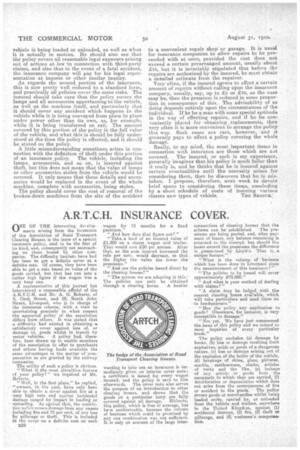A.R.T.C.H. INSURANCE COVER.
Page 22

If you've noticed an error in this article please click here to report it so we can fix it.
niVE OF THE interesting clev.elopX--1 ments arising from the forrrtation of the Association of Road Transport Clearing Houses is the issue of a special insurance policy, said to be the first of its kind, and, consequently not encroaching on those issued by other companies. The difficulty hauliers have had has been to get a definite cover at a definite rate. Of course, they have been able to get a rate based on value of the goods carried, but that has run into a rather high figure if the wagon was a very busy one.
A representative of this journal hat interviewed a responsible official of the A.R.T.C.H. and Mr. A. 0. Roberts, of 8, Cook Street, and 19, South John Street, Liverpool, who is in charge of the insurance scheme, with a view to ascertaining precisely in what respect the approved policy of the association differs from others. It was stated that a difficulty had existed in obtaining a satisfactory cover against loss of, or damage to, goods whilst in transit by
motor vehicles. A policy had, therefore, been drawn up to enable members of the association to offer to merchants and others baying loads available the same advantages in the matter of 'compensation as are granted by the railway companies.
The utility of such a policy is obvious. "What is the most attractive feature of your policy?" we inquired of Mr. Roberts,
" Well, in the first place," he replied, "owners, in the past, have only been able to obtain a cover against fire at a very high rate and against incidental damage caurd by impact in loading or unloading. As against that, the association policy covers damage from any causes including fire and 75 per cent, of any loss by pilferage or theft. This is included in the cover on a definite sum on each
B28 wagon for 12 months for a fixed premium."
'And how does that figure out?" " Take_ a load of an insured value of
1,500 on a steam wagon and trailer. That would cost £30 per annum. After that, as the sum insured increased the rate per cent, would decrease, so that the higher the value the lower the premiums."
"And are the policies issued direct by the clearing houses?"
"The system we are adopting is this The policies can only be obtained through a clearing house. A haulier wanting to take out an insurance is immediately given an interim cover note; a certificate is issued for every wagon insured, and the policy is sent to him afterWards. The cover note also serves the purpose of an introduction to other clearing houses, and shows that the goods on a particular lorry are fully covered against all damage. Hitherto, this policy, which is free of average, has be-n unobtainable, because the volume of business which could be promised by any one combination was not sufficient. It is only on account of the large inter connections of clearing houses that the
scheme can be established. The pre. miums are being pooled, and, after payment of losses, any balance remaining is returned to the insured, but should the losses exceed the premiums the difference is guaranteed by LloYd's. That is. a. unique feature."
"What is the volume of business which has been done in Liverpool since the announcement of this insurance?"
"The policies to he issued will cover approximately £75,000."
"And what is your method of dealing with claims?"
"A claim may be lodged with the nearest clearing house available, which will take particulars and send them on to headquarters."
"Has the policy any application to goods? Glassware, for instance, is very susceptible to damage."
" Not yet. We have just commenced the issue of ihis policy and we intend to inquiries nquiries of every particular trade."
The policy excludes. (a) damage by hooks. (b) loss or damage resulting from explosives, acids or goods of a dangerous nature. (c) loss or damage arising out of the explosion of the boiler of the vehicle, (d) breakage of china, glass, pictures, marble, earthenware, clocks, articles of vertu and the like, (e) leakage of any article or goods from the receptacle in which they•are carried, (f) deterioration or depreciation which does not arise from the consequences of fire or accident to the goods. The policy onvers goods or merchandise whilst being loaded on/to, carried by. or unloaded from the vehicle and trailers, anywhere in the -United Kingdom, against (1) accidental damage, (2) fire, (3) theft or pilferage, and (4) workmen's compensa. ton.




























